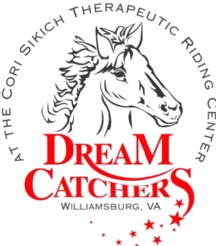Therapeutic Horseback Riding and Autism
Local study one of largest of its kind benefiting families nationwide
 Dream Catchers at the Cori Sikich Therapeutic Riding Center and the College of William & Mary School of Education have announced findings from one of the largest quantitative studies conducted on children with autism and therapeutic horseback riding. The group of researchers has presented their findings at the PATH (Professional Association of Therapeutic Horsemanship, formerly known as NARHA) International conference in Lexington, Kentucky, and will present the results at the Council for Exceptional Children conference in spring 2012.
Dream Catchers at the Cori Sikich Therapeutic Riding Center and the College of William & Mary School of Education have announced findings from one of the largest quantitative studies conducted on children with autism and therapeutic horseback riding. The group of researchers has presented their findings at the PATH (Professional Association of Therapeutic Horsemanship, formerly known as NARHA) International conference in Lexington, Kentucky, and will present the results at the Council for Exceptional Children conference in spring 2012.
The study followed 21 elementary school children with autism over a 30-week period in the therapeutic riding classes at Dream Catchers at the Cori Sikich Riding Center and in the classroom. Children's behavior was rated by the classroom teachers at specified times during the 30 weeks.
The Impact of Therapeutic Riding on the Social Communication and Sensory Processing of Children with Autism study found that children with autism who participate in therapeutic riding show statistically significant improvement on the Gilliam Autism Rating scale Autism Index, and on the social interaction subscale. This improvement is documented both in the riding lessons and in the classroom. With fewer symptoms, the children demonstrated calmer behavior, improved relationships with others and greater engagement in learning.
The study also finds that the symptoms are reduced only with continued therapeutic riding. After a 6-week break from the riding lessons, the degree of autism symptoms returned to pre-riding levels. However, once back in the saddle, the children's symptoms rapidly improved and benefits quickly regained.
"This is an exciting study for parents and teachers of children with autism," says study researcher Sandra Ward, PhD, School Psychology Professor specializing in assessment at the College of William & Mary School of Education. "There is a significant decrease in autism symptoms, especially with regard to social interaction, that manifests in the child's classroom behavior."
"Traditionally, the primary goal of therapeutic riding is to improve riding skills. Yet, the findings of this study show evidence of therapeutic riding's effectiveness as a form of social therapy as well," Dr. Ward continues.
"We have always heard from parents of students with autism about the successes and improvements they witness in the children as a result of the therapeutic riding. This study demonstrates their intuition with scientific data about the benefits these children experience from our four-legged friends," says Nancy Paschall, Executive Director at Dream Catchers at the Cori Sikich Therapeutic Riding Center.
The study was conducted by Sandra Ward, Ph.D., and Kelly Whalon, Ph.D., with The College of William & Mary School of Education, Kim Wendell, B.S., Kat Rusnak, B.S., and Nancy Paschall, B.S., with Dream Catchers at the Cori Sikich Therapeutic Riding Center. Wade Johnson, M.D., provided guidance on the study.
For more information, call (757) 566-1775 or visit www.dreamcatcherswilliamsburg.org.
About Dream Catchers at the Cori Sikich Therapeutic Riding Center
Dream Catchers at the Cori Sikich Therapeutic Riding Center is the premier therapeutic riding center between Richmond and Virginia Beach. Located in Toano, Virginia, Dream Catchers is a nonprofit organization hosting more than 120 therapeutic riding lessons each week to help children and adults with special needs reach their potential and make dreams come true.